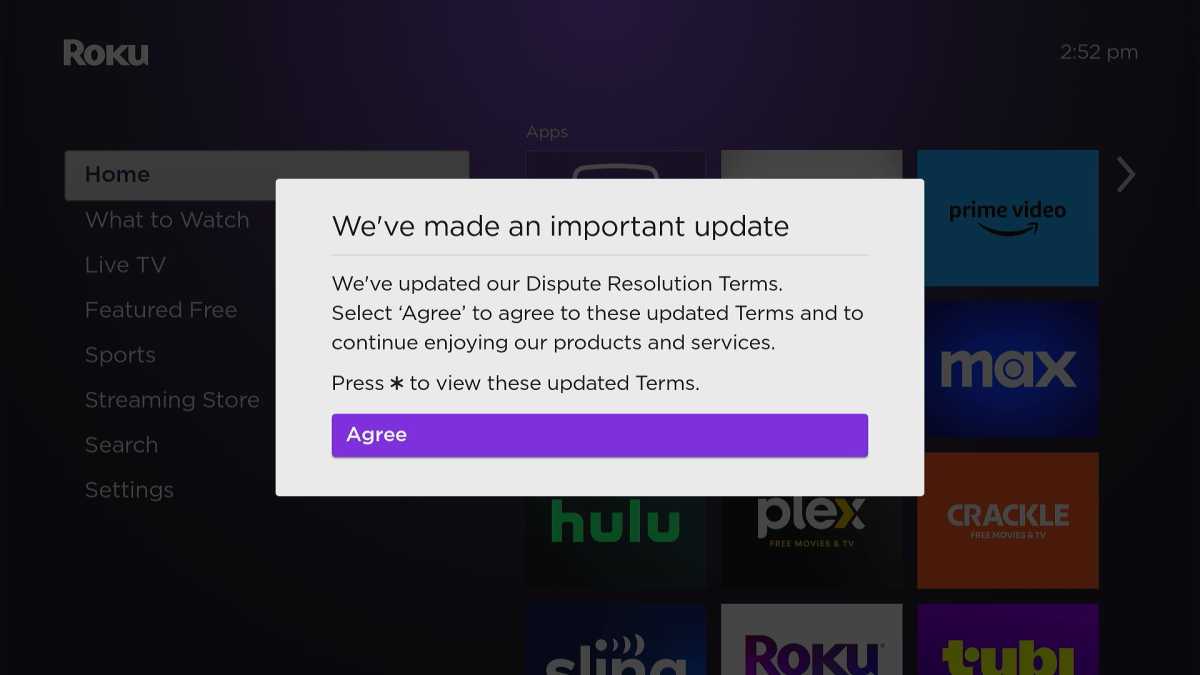Last weekend, Joey Maggard couldn’t watch basketball because his Roku TV had suddenly become unusable.
At issue was Roku’s new dispute resolution terms, which users had to accept before they could keep using their Roku smart TVs and streaming devices. Because Maggard had lost his original Roku remote, he had no way to accept the new terms and switch inputs to the Apple TV streaming box he usually uses. He eventually reprogrammed an old universal remote to control the TV and accept the terms, but the experience wasted a lot of time and left him feeling bitter.
“This is unacceptable behavior and people need to be warned not to buy a Roku TV if this is how they are going to treat their customers,” Maggard said via email.
Maggard isn’t alone in feeling jilted by Roku’s new terms, which also spell out how users can’t file class action lawsuits against the company. One complaint thread on Roku’s forums has roughly 400 comments, and similar threads abound on Reddit and Hacker News.
This review is part of TechHive’s in-depth coverage of the best media streamers.
While some of the outrage stems from a misunderstanding—Roku’s terms have required users to waive class action and jury trial rights for years now—users also took exception to having their TVs held hostage by an agreement that in some cases they had no way to accept. The ordeal left some folks pining for dumb TVs that don’t put up a fight when you try to use them in the most basic way.
Roku’s new terms

Jared Newman / IDG
Those who read Roku’s new dispute resolution terms might have been troubled by the all-caps disclaimer at the top. It reads, in part:
WITH LIMITED EXCEPTIONS, THESE TERMS PRECLUDE YOU AND ROKU FROM SUING IN COURT OR PARTICIPATING IN A CLASS ACTION AND YOU AND ROKU AGREE THAT ARBITRATION WILL BE SOLELY ON AN INDIVIDUAL BASIS AND NOT AS A CLASS ARBITRATION, CLASS ACTION, OR ANY OTHER REPRESENTATIVE PROCEEDING. YOU AND ROKU ARE EACH WAIVING THE RIGHT TO TRIAL BY A JURY.
In the past we’ve seen smart TV makers settle class action lawsuits over faulty hardware, misrepresented features, and inadequately disclosed snooping. Roku wants users to waive those rights and settle any disputes through private arbitration proceedings, which can be more expedient than lawsuits but tend to favor companies over consumers.
While Roku’s new terms make the arbitration requirement exceedingly clear, it’s not new. According to the Internet Archive’s Wayback Machine, Roku has required users to accept binding arbitration and waive their class action rights since at least 2019. The new terms’ most notable changes are a mandatory “meet-and-confer” with Roku before arbitration begins, and a distinct procedure for “Mass Arbitrations” involving 25 or more claimants.
Roku also isn’t alone in trying to cut off class action lawsuits. The U.S. Supreme Court has repeatedly rejected challenges to this behavior, most notably in a 2011 case against AT&T that alleged deceptive advertising, and thousands of companies have since inserted class action bans into their contracts, the New York Times has reported. While Amazon and Apple don’t require arbitration, Google started waiving class action rights for device users in 2021. Samsung, LG, and Vizio have binding arbitration clauses as well.
None of which means that Roku’s new terms are great, but they’re the largely the same as what existed before, both from Roku and other vendors. The more unique element—and what caused this whole fracas—is the way Roku presented those terms.
Accept the terms or your TV won’t work
Because Roku locked users out of their TVs and streaming devices until they accepted the new terms, a couple of things happened:
- More people than usual were compelled to actually read the legalese, thereby discovering how odious these agreements can be.
- Some users couldn’t accept the terms at all, either due to a missing remote or other technical issues, thereby discovering that they don’t exactly own the TV they paid for.
The fact that Roku users couldn’t use their TVs in any way without accepting the new terms is especially irksome, and underscores how intrusive modern smart TV software has become.
Because of the “post-purchase monetization” potential, TV makers really want you to use their built-in software and have made defaulting to a different input increasingly difficult. Even if you do primarily use a separate streaming device or cable box with your smart TV, it will collect data on everything you watch through those external sources unless you adjust the appropriate privacy settings. (The latter point might explain why Roku needs users to accept its new terms before they can even switch inputs.)
None of this is made clear up-front to users, for whom software is just one consideration when buying a new TV. As one affected user put it in Roku’s forums: “To reiterate, I didn’t choose a Roku streaming device … It was simply included with the TV I liked. If I’d known that I would be forced to agree to Roku’s terms to simply turn on my [expletive] TV, I never would have purchased it.”
Instead of commenting on the specific issues that users raised, Roku sent along the following statement: “Like many companies, Roku updates its terms of service from time to time. When we do, we take steps to make sure customers are informed of the change.”
It’s worth noting that Roku emailed users about the new agreement as well, and it probably wouldn’t have gotten much blowback had it stopped there. Instead, Roku served up a reminder of how entwined its software has become with basic TV functionality.
For a lot of users, it was a rude awakening.
Sign up for Jared’s Cord Cutter Weekly newsletter to get columns like this one every Friday.
Correction: This story originally stated that Joey Maggard was unable to watch baseball, not basketball. We regret the error.

